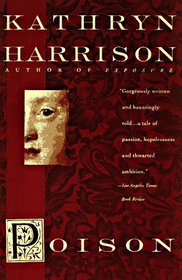A gripping tale set in Spain during the Inquisition. This is the story of a princess, Maria Luisa (nee Marie Louise de Bourbon), wife of Carlos II of Spain; and Francisca, daughter of a silkworm farmer in rural Spain. Born on the same day, their lives take different paths, but both lead to tragic fates.
I have only read one other of Kathryn Harrison's books ('The Binding Chair') and liked it enough to search out more of her work. 'Poison' gripped me almost from the beginning - Harrison's prose weaves a compelling story that I was hard pressed to put this down to sleep. I don't like it nearly as much as 'The Binding Chair' but would recommend it to others to read.
I have only read one other of Kathryn Harrison's books ('The Binding Chair') and liked it enough to search out more of her work. 'Poison' gripped me almost from the beginning - Harrison's prose weaves a compelling story that I was hard pressed to put this down to sleep. I don't like it nearly as much as 'The Binding Chair' but would recommend it to others to read.
Helpful Score: 2
This book was interesting--but not recommended for readers who are unaccustomed to Kathryn Harrison's style of writing. Harrison has a tendency to include long passages of details that sometimes slows the story down; this can be either beautiful or annoying to the reader. But if you can look past the sometimes arduous chapters, the story is quite fascinating.
Helpful Score: 1
Beautifully written historical novel that centers around the auto-da-fe in the time of Louis XIV.
Helpful Score: 1
Ms. Harrison has a very picturesque and poetic style of writing. I enjoyed how the 2 young women's lives entertwined, but a bit too much jumping around for me. Also, the young queen did not have a very likable personality, seemed rather hysterical and spoiled. Francisca was intelligent, just made some bad choices. Parts were quite steamy (whew!) but well-written and will make you sigh aloud! Seemed very true to the era. A must read if you enjoy novels about the old monarchy (think Philippa Gregory).
Helpful Score: 1
Perhaps Harrison's most signal achievement in this story of two doomed women is her reflection of their time and place: Spain in the 17th century, a sordid and barbarous era. Harrison (Exposure) is totally in command of her tragic narrative, which proceeds with the stately, mesmerizing pace of a pavane, stepping to one side to look behind, to the other to look ahead. Francesca Luarca, a humble silk farmer's daughter, is arrested for witchery. Her story parallels that of Queen Maria Luisa, the French Bourbon princess married to the impotent king of Spain, whose inability to produce an heir to the throne condemns her to death as surely as imprisonment in the Inquisition's prisons dooms Francesca. Francesca commits several sins: she begs a priest to teach her to read (a dangerous ambition for a woman); he also introduces her to carnal delights and impregnates her. Francesca is destroyed by passion, the queen-who is also called a witch by the jeering mob-by its complete absence. Hovering over everything is the ominous shadow of the Inquisition, fed by a greedy, corrupt church that plays on fears of devils and witches but forgives "sins" on the payment of hefty fines. Harrison weaves a marvelous tapestry of almost palpable details: people in Madrid wore enormous jeweled spectacles, "an enhancement to dignity rather than eyesight"; "the Spanish nobility's desire for loftiness was so intense and so literal that aristocratic women balanced on stilts."





